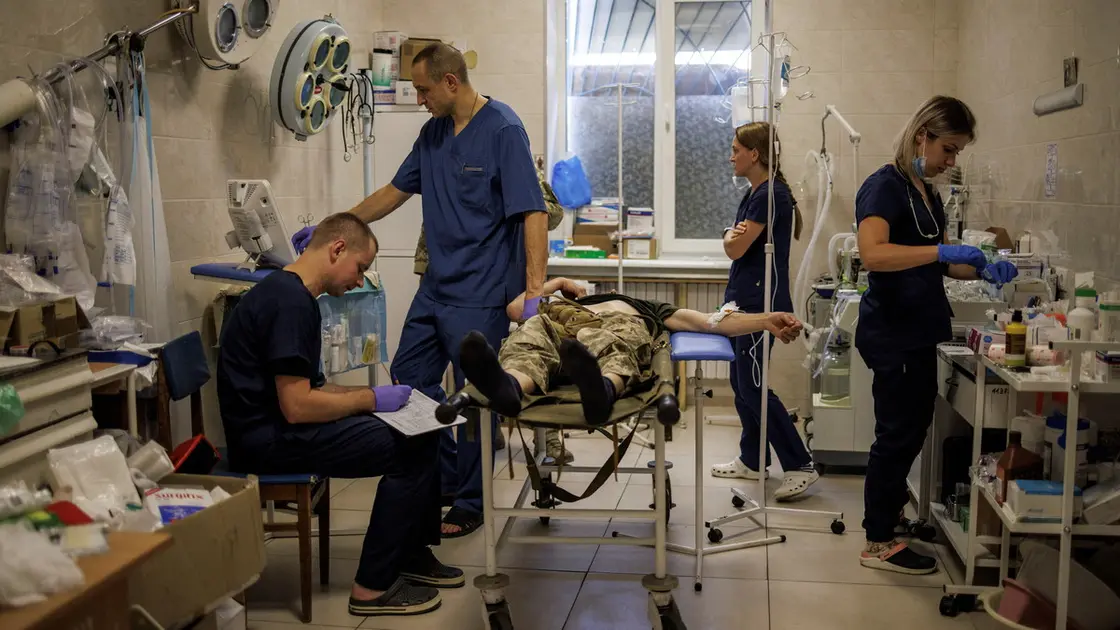Mental health specialists have sounded the alarm about the potential psychological crisis of healthcare workers working on the frontline in conflict zones such as Ukraine, saying a lack of support is leading to crises amongst the workers themselves.
Director of psycho-oncology at the American University of Beirut Medical Center, Dr Maya Bizri, told Al Arabiya English that she has assessed healthcare workers in Ukraine and the effects of war have scarred many.
The doctor, who specializes in psychiatry for the medically ill, specifically those with chronic illnesses and the mental health of healthcare professionals themselves, said it is not just victims of war that need access to mental health support.
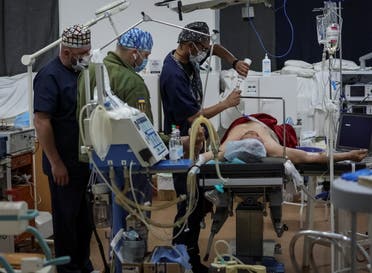
Pointing to healthcare workers in war-torn Syria, she said many doctors and healthcare workers were found to have turned to substance abuse – such as alcohol and the highly addictive amphetamine Captagon – to cope with what they have witnessed on the frontline of care.
From her experiences in Ukraine, Dr Bizri believes the country could find itself in a similar state of healthcare emergency as experienced by Syria due to a lack of support, resources, training, burnout among healthcare workers, and PTSD (post-traumatic stress disorder).
‘Moral injury’
Dr Bizri visited Ukraine, following a request from the country’s Minister of Health to train healthcare workers in trauma-informed care, advising them on how to care for their own mental health and also for their colleagues and how to take care of physicians of patients who had undergone psychological distress.
“As combat soldiers, you obviously get a lot of training on psychological wellbeing, yet you don’t get that as a physician, though you’re still expected, as a doctor or nurse, to deliver quality care,” she said, adding that healthcare workers can face different impacts of working in conflict zones, including burnout and “secondary traumatic stress.”
“This is when you are not exposed to actual war like soldiers, but you have a vicarious trauma, which is a sense of compassion fatigue – you hear the stories and are reliving other people’s traumas,” she explained.
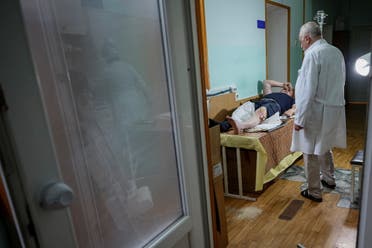
The doctor found that many health workers in Ukraine also suffer from “moral injury.” “It is a type of psychological injury where the reality that you live in and practice in is not aligned with your moral compass.”
This was found among frontline workers during the COVID-19 crisis, who had to make difficult decisions daily, said the doctor. “You had these doctors who had to decide who gets a ventilation and who doesn’t. Do I come to work, show up to work and care for people at the expense of being at risk of exposing my family to COVID-19?
“These were difficult choices that one doesn’t get trained into making. In Ukraine, you see other types of moral injury in disaster settings. In any low-resource setting – low on human resources and a shortage in the supply chain because of the war – usually, the moral code of a healthcare worker is to put patients first. That is what you do as a healthcare worker – care for patients the best way you can,” she said.
However, a shortage of workers and supplies – such as medicines, oxygen and insulin, surgical supplies, anesthetic, blood and transfusion kits – can force doctors into moral dilemmas.
“For instance, I know how to treat this person, but I don’t have the antibiotics for it. So, I’m forced to make a less-than-optimal decision, knowing that the patient may not recover, and I feel like I’m a bad person. I feel ashamed,” the doctor further explained.
“Or, I may be having too many patients to care for in the hospital and I cannot spend enough time with each and every one of them. So, I go back home to my family. I end up spending too little time with the patients, which may lead to medical errors and complications,” Dr Bizri said.
“Another type of moral injury we saw was with internally displaced healthcare workers. So, we had some from the eastern border who had to leave everything behind and immigrate to a different part of the country. One nurse was telling us about the guilt she felt that she had to leave her family behind and was taking care of strangers.”
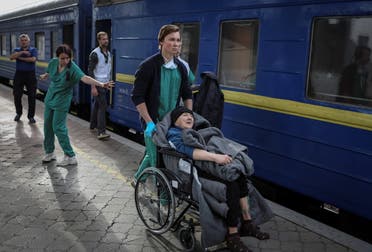
The doctor also shared a story from healthcare workers who felt guilty over having “negative thoughts” about treating patients from different parts of Ukraine who were not politically aligned with them.
“They have these patients coming from the eastern parts of the country and they have to treat them as Westerners, even as the patient goes ranting, ‘it is your fault … you Westerners started the war,’ and so on,” the doctor said, adding that these emotions are too intense in a war or conflict situation when everyone has his or her personal losses to deal with.
Dr Bizri said that right now, research on psychological distress among healthcare workers is being borrowed from combat veterans. You’re supposed to have a ‘holier than thou’ attitude to things, and you’re supposed to do something very noble and not act like you’re not trained or not equipped to deal with these dilemmas. This is in sharp contrast to a well-trained soldier who goes to war with the full knowledge that he or she may end up doing things on the battlefield that may be morally distressing.
Risk of substance abuse
Among the general population, the World Health Organization (WHO) estimates some 10 million individuals are potentially vulnerable to mental disorders, including acute stress, anxiety, depression, substance abuse and PTSD.
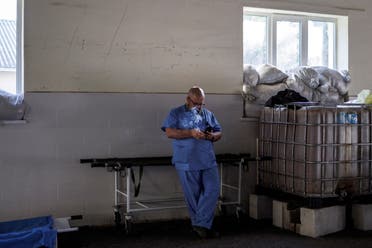
Community Mental Health Teams (CMHTs) established in Ukraine in 2016, amid earlier conflicts, are proving their value all the more at the present time, adjusting to realities on the ground. Since the conflict began, CMHTs have started using remote consultations, such as phone calls or video calls, continuing to care for people who remained locally or moved to neighboring countries.
However, Dr Bizri said that often, those on the frontline of care don’t reach out for help themselves. Recalling her time, she said she also worked with healthcare workers in Ukraine on the risks of substance abuse while being engaged in conflict settings.
In Lviv, a nurse told Dr Bizri she was witnessing an increasing number of her colleagues turning to alcohol as a coping mechanism to deal with the traumas they encounter daily.
“I think it’s becoming more and more problematic. Just to keep in mind, in Ukraine, even before the war, alcohol use disorder was prevalent among the general population. So, as a culture, they had this problem to start with. To that, add all the stress of the war, the overwork and the burden that comes with a moral crisis.”
A ‘ticking time bomb’
According to Dr Bizri, many healthcare workers are starting to lose their sense of job satisfaction and the meaning of why they are in the job that they are doing.
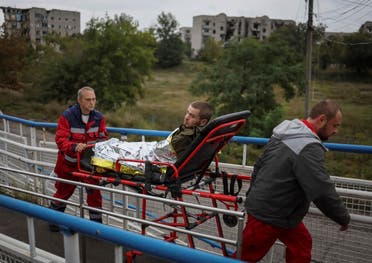
Specialist psychiatrist at Prime Corp Medical Center, Prime Healthcare Group Dubai, Dr Ajay Kumar, told Al Arabiya English that the mental health crisis among health workers in conflict zones is a “ticking time bomb.”
He pointed out that one of the most devastating consequences of the war in Ukraine has been its profound impact on mental health, an unprecedented scale of suffering in Europe since the conclusion of World War II.
Doctors working in the country are no exception to this grim reality and are not immune to feelings of anxiety, sadness, sleep disorders, fatigue, anger and unexplained physical symptoms.
“Increasingly overwhelming conditions of the Ukraine war can leave many health providers unprepared for the mental health fallback,” he said. “They need to make agonizing life-and-death decisions in a demanding and unpredictable environment, which can put healthcare workers at risk of developing PTSD.”
WHO representative in Ukraine and head of the WHO Country Office in Ukraine, Jarno Habicht, says that healthcare workers also face the mental stress of working in dangerous settings, with hundreds of attacks on hospitals or clinics across the country since the war began.
He pointed to one incident of an attack on healthcare facilities on Feb 24, 2022, when a hospital came under heavy shelling, killing four people and injuring ten, including six healthcare workers in Vuhledar, in the Donetsk region.
“Today, in Ukraine, medics are on the frontline, working tirelessly to save lives while risking their own. The sanctity and safety of healthcare, including that of workers, patients, supplies, transport and facilities –must be respected,” Habicht said.
No one is immune to effects of stress, trauma
Dr Kumar said compassion fatigue, also known as secondary traumatic stress, is common among caregivers who spend a significant amount of time, working with the seriously ill and traumatized.
“Physicians, caregivers and volunteers who help others are extremely empathetic people and their generous and caring nature may heighten their vulnerability to compassion fatigue,” he explained.
Dr Kumar said while healthcare professionals are highly trained and accustomed to solving problems, healing others and managing pressure, no one is immune to the long-term effects of stress and trauma.
He advised that healthcare professionals struggling to cope should communicate about job stress with coworkers, supervisors and employees.
“Talk openly about how job stress is affecting your wellbeing, identify factors that cause stress and work together to find solutions; ask about how to access mental health resources in your workplace and identify and accept the things that you don’t have control over,” he suggested.
Psychiatrist at NMC Hospital in Dubai, Dr Barjis Sulthana, also feels that healthcare professionals working in conflict zones are faced with myriads of problems.
“Issues are diverse, including a threat to their own safety and survival, lack of supplies, working under immense pressure and exhaustion and even complete burnout. As refugees from these conflict areas are migrating to different parts of the world, even healthcare workers far from war and conflict are vicariously undergoing trauma and distress,” Dr Sulthana explained.
“Since the COVID-19 pandemic, healthcare workers are undergoing immense stress and burnout and these conflicts are worsening an already weakened system. This could also lead to migration of these workers, which will cause a dent in the rebuilding of health systems and infrastructure in these conflict zones,” she added.
“Structured violence prevention programs should be made part of training and medical education, with strict laws preventing violence against health workers made a global initiative,” she suggested.
